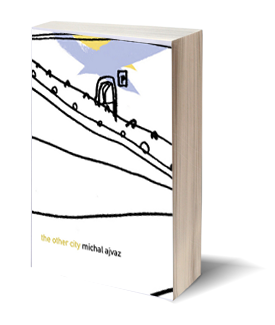The Other CityMichal Ajvaz
|
 |
|---|
Reviewed by John Madera
If you love a story that begins with finding a mysterious book in a musty antiquarian bookshop, a book filled with fanciful indecipherable script, a book with disturbing illustrations depicting a strange and terrible world, a world of golden temples and murderous tigers, and if a story with a book hinting that a parallel world exists within everyday life’s interstices, or, rather, within the very walls, alleys, and even furniture (including wardrobes) of the so-called real one, “a world in such close proximity to our own, one that seethes with such strange life, one that was possibly here before our own city and yet we know absolutely nothing about it,” where televisions talk to each other and sounds waft out of postcards, a frightening world of flying and talking fish, shark-headed attackers, crazed weasels, a world of cryptic speech and arcane rituals, a story where the “real” world’s libraries turn into jungles, where pianos turn into crabs, where a small cylinder in a park is really a cupola’s skylight turret, a story as much concerned with unraveling the mysteries of language as it is in weaving a spiraling intrigue of its own through unapologetically overwrought, longwinded, and interminable prose, a prose weighted by perspicacious and a kind of claustrophobic attention to detail, a prose that like the phosphorescent statues it describes is “in the style of a kind of gloomy subterranean Baroque,” a prose reminiscent of Conrad’s voluble interior chatter and Borges’s pseudo-scientific and philosophical ramblings, a prose issued by a peripatetic and persnickety narrator whose own gifted and jeweled loquacity apparently never slows him down, or annoys any of the other characters, for that matter, since they too offer labyrinthine monologues filled with fascinating asides, essayistic descriptions, and absurd connections and explanations, and where they talk of “banned verbal tenses,” and “the white monster tense and the jungle tense,” and of how “all verbal endings are totally harmless and have nothing to do with the evil music that destroys shiny machines,” and of how “[c]ase endings will eventually free themselves from their demeaning position and shine once more in their ancient glory,” and how “[b]it by bit they will separate themselves from the roots of nouns and become what they were at the beginning—the invocation of demons,” and if a story like this also turns out to be a love story, a love story between the hero and an irksome, at best, and sometimes deadly romantic foil, a love story that never really consummates, whose rare intimacy is a silent cuddling together “of two bodies with which something reaches out to the darkness and frost, as atrocious as any of the monsters creeping about the plains of the stars,” and if this love story is really a smaller one beneath a larger love story, like an umbrella under a canopy, that is, a story that is really a love letter to language, if a story like this interests you, then Michal Ajvas’s The Other City, the first of the Czech writer’s novels to be translated into English, would be a great one to pick up, for while the romantic undercurrent between the narrator and his muse pulsating throughout the story is an intriguing one, it is his love of books and language that drives his obsessions like wandering Prague’s narrow gothic and baroque streets, its sprawling Old Town Square, and sundry ledges, alleys, and shadowed corridors, a love of language signaled when he (paraphrasing Ajvas) returns to his book, savors its aroma and allows his eyes to “flit over its pages, reading here and there the fragment of a sentence that suddenly sparkled mysteriously because it was taken out of context,” an obsession that—after learning that the “library is a treacherous place”—leads him to conclude that “books treat solely of other books and that signs likewise refer to other signs; that a book has nothing to do with reality, but instead reality itself is a book since it is created by language…that books and signs remain rooted in reality and governed by its unknown currents, that our signifying and communicating is embedded in being, which signifies itself, its secret rhythms, and that original signification, that original dull glow of being keeps alive our meanings while at the same time threatening to swallow them again and dissolve them in itself,” all of which leads this reader to believe that Michal Ajvas may have written The Other City so that its reader is inspired to follow the narrator’s lead and allow his or her eyes to randomly flit over its pages, and find countless examples of mysteriously sparkling sentence fragments, sentences where plot is a kind of secondary scaffolding from which to drape them, sentences that would as much open up the doors of perception as transfix the meandering waves of attention, sentences that like the alphabet from that magical book this whole story begins with seem “to be bursting under the pressure of some expanding internal force,” sentences full of yearning, of disquieting awe, sentences that seek a lost beginning, sentences positing “that the dread you feel on the periphery of your world is the beginning of the bliss of return, that death in the jungles of the margins is a shining rebirth.”
